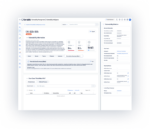International computer expo CeBIT, for the first time this year, has targeted a business crowd instead of simply displaying the next cool dev tool.
There were more than 300 startups on hand, making the show ripe for development opportunities.
CeBIT’s support for app development was clearly evident. In Hall 6 was everything software, including many development tools and development platform vendors, as well as Space:d, an area dedicated to all things development. Space:d hosted a BarCamp called Developer Playground @ space:d on Wednesday and Thursday. The open workshop was attended by Sascha Pallenberg and Alexander Martin from Augmentation, where they discussed their latest projects that include everything from data glasses to smart mobility apps.
Adding to the enthusiasm on Friday was Hackathon @ space:d, an event that featured programming sessions with developers working under the pressure of time and under the watchful eyes of onlookers to solve real-world problems ranging from programming for various mobile devices to controlling complex Kinect systems.
The show opener on Sunday night featured dignitaries like German Chancellor Angela Merkel and British Prime Minister David Cameron. Merkel noted in her opening keynote that “It is fitting that this year’s major country sponsor was Great Britain since it is Germany’s largest trading partner.” Both leaders emphasized CeBIT’s major themes as being a direction that businesses had to move aggressively toward to remain competitive in the now inescapably global economy. Technology on everyone’s mind were the Internet of Things, Big Data, and all iterations of the enterprise cloud.

The Internet of Things meets Big Data
Who would think of a huge farming combine as being part of the global scheme of the Internet of Things or as machinery that could take advantage of Big Data? It turns out they go hand-in-hand when it comes to large farming equipment talking to each other.
Applications that support cooperative communications must be developed and continually improved upon if the farming equipment is to orchestrate movement of grain trucks, harvest off-loaders and other machinery. Damage to the global economy in the form of price hikes, supply and demand inequities and more could ensue from GPS interference with crop harvesting. Continual improvement of agricultural GPS-focused management software is necessary to fend off disasters like a combine going off course. Farm manufacturer Claas had a huge combine on display demonstrating how the use of Big Data in the Internet of Things contributes to successful farm techniques by providing soil samples and mineral content among other types of information.#!Big Data breaks out
This is the year of Big Data and innovation surrounding it. Code_n, an international initiative for digital innovators and startups, hosts a global contest that looks for the 50 most innovative companies, and then supports their exhibit at CeBIT. The 2014 theme was driving the data revolution.
London-based Viewsy, an app that helps retailers better understand their customers behavior, beat out more than 450 other contestants from 60 countries to win the 2014 Code_n award and its prize money of 30,000 euros. AutoGrid Systems based in Redwood City, Calif., Sablono based in Berlin and Munich startup cosinuss were among the top finalists for the Code_n award.
Another organization that captures the application developer imagination is the non-profit Skolkovo Foundation. Founded in 2010, its objective is to speed up Russia’s economy toward becoming an innovation-driven economy and away from being a resource-intensive one. The foundation created a physical Innovation Center, much like an incubator firm, housing 1,000 various companies and startups, several of which are software development entities.
The Skolkovo Institute of Technology, located near Moscow, is a graduate research program in collaboration with MIT. The goal is to build an ecosystem that promotes and encourages entrepreneurship and creative thinking. Several U.S.-based companies like Boeing, Cisco Systems, IBM, Intel, Johnson & Johnson and others have signed on as R&D partners.
Some of the promising startups included C3D Labs, which makes a geometric modeling kernel for 2D and 3D software developers; Appercode, development software for developing native cross-platform mobile applications in C#; iBuildApp, an automated drag-and-drop mobile app development platform with templates and widgets; and MedM, a software platform for mobile health monitoring on smartphones or tablets with more than 70 sensors available for use.
You can (not) hear me now
Given Edward Snowden’s whistle-blowing revelation that the NSA had regularly listened in on Angela Merkel’s cell conversations, there was a clear message to developers: Protect your applications, especially your voice ones. From the number of software apps designed to secure and encrypt mobile voice (and the dev tools to create those apps) in exhibit in Hall 4, it’s clear that Snowden has almost single-handedly created a vibrant new offshoot to the traditional security market.
Well-known security leaders that participated this year included ESET, Kaspersky Lab, Secusmart (known for its Chancellor Phone that provides sophisticated end-to-end encryption) and Trend Micro. In addition to Secusmart, a few other mobile phone companies like T-Systems are taking security a step further and marketing “toughened” phones like the SiMKo3, which was approved by the German Federal Office for Information Security. It distinguishes between public and protected areas, then separates its applications and data. Users swipe their fingers across the screen to switch between the secure and open operating types. The L4 high-security microkernel takes control of the device when it’s booted and permits only secure actions. SiMKo3 is also a tap-proof crypto phone, using high-security encryption and the government’s official Secure Multi-Network Voice Communication Standard.





